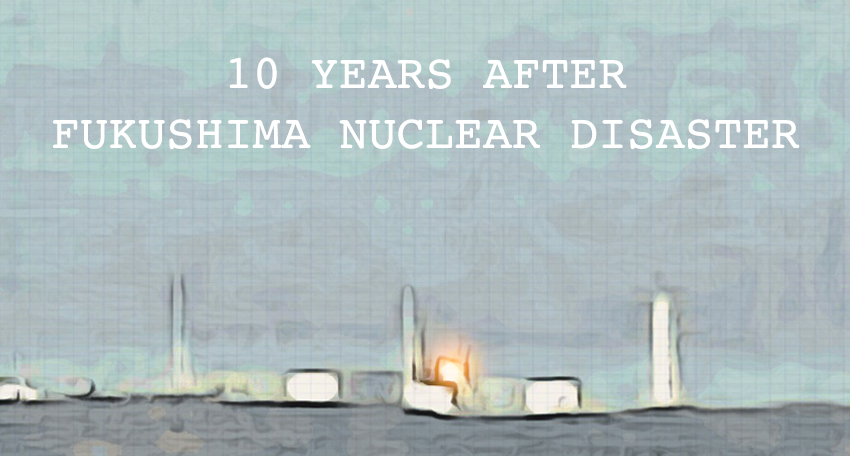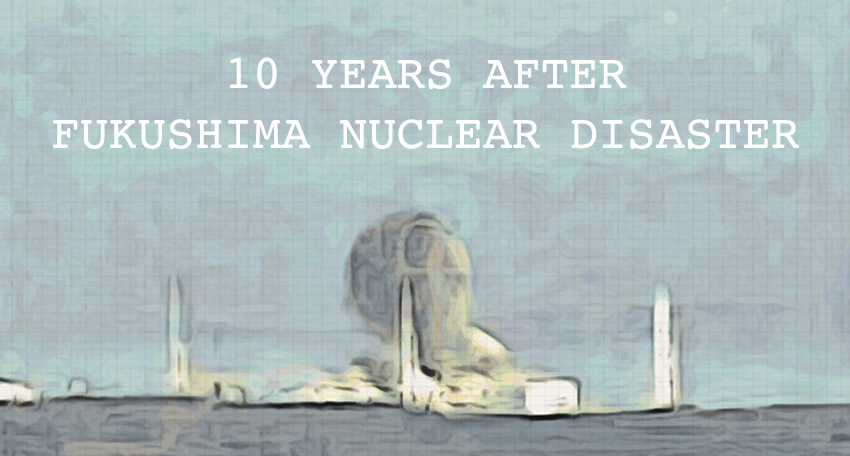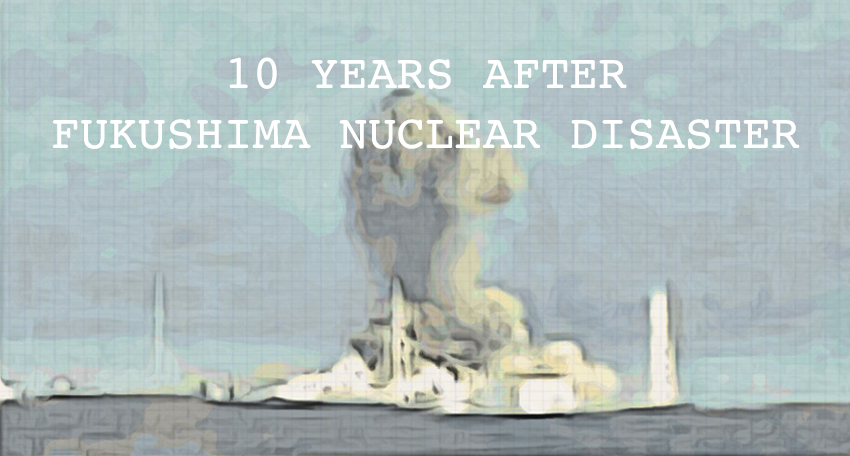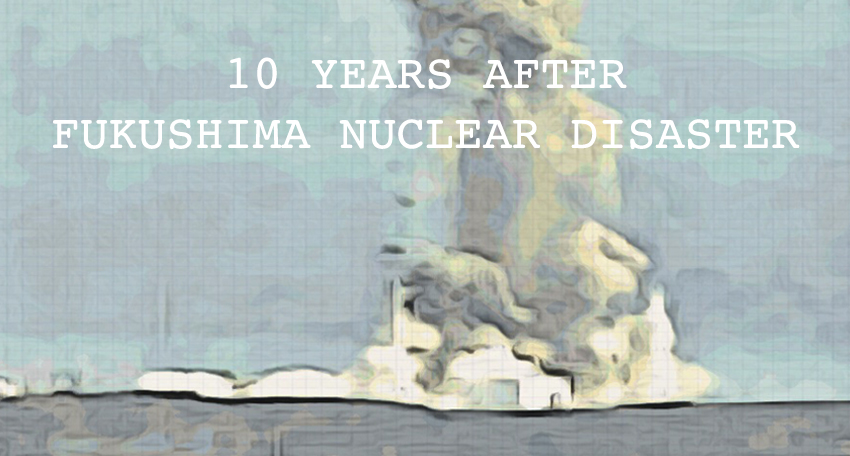
June 5, 2021
Consulate General of Japan in New York
The Permanent Mission of
Japan to the United Nations
To Mark World Environment Day (June 5)
and World Ocean Day (June 8) 2021
Dear Ministry of Foreign Affairs
and Ministry of Economy, Trade and Industry,
We, the undersigned, are groups in the United States. We are sending this letter to strongly condemn the recent decision of the Japanese government to release approximately 1.25 million metric tons of radioactive water from the crippled Fukushima Daiichi nuclear power plant into the Pacific Ocean. We would greatly appreciate it if you could share this letter with the leadership of the Ministry of Economy, Trade, and Industry and the Ministry of Foreign Affairs in Tokyo.
We are very concerned that Hitachi’s Advanced Liquid Processing System (ALPS) cannot remove all radioactive materials before the dumping, as the Japanese government has repeatedly admitted. The contaminated water stored at the Fukushima Daiichi is fundamentally different from the water coming from a nuclear power plant during a regular operation.
The contaminated water at the Fukushima Daiichi is highly radioactive because it was used to cool the highly radioactive melted core of at least four nuclear reactors of the crippled plant that had meltdowns caused by the loss of cooling capability in March 2011. Due to the ongoing high radiation dose at the facility – as high as 42 Sv/h in a reactor containment vessel that could kill a person instantly in addition to 5150 mSv/h in the reactor buildings - the radioactive water accumulated in the Fukushima Daiichi contains an extremely high level of radioactivity.1 2 Radioactive isotopes, such as tritium (H-3) and carbon-14 cannot be isolated from water at all by the ALPS.3 4 Radioactive iodine, ruthenium, strontium, and other radioactive isotopes may also remain in the water after being processed by the ALPS.
Last month, three independent human rights experts appointed by the United Nations Human Rights Council expressed deep regret at the decision of Japan in a joint statement, saying that the “decision is particularly disappointing as experts believe alternative solutions to the problem are available.” 5 They expressed their concerns that the dumping of radioactive water from the Fukushima Daiichi “could impact millions of lives and livelihoods in the Pacific region,” and such dumping “imposes considerable risks to the full enjoyment of human rights of concerned populations in and beyond the borders of Japan,” and “reminded Japan of its international obligations to prevent exposure to hazardous substances, to conduct environmental impact assessments of the risks that the discharge of water may have, to prevent transboundary environmental harms, and to protect the marine environment.” 6 Id.
We join international calls for the Japanese government to halt its decision to dump radioactive water into the Pacific Ocean. We also request the government to explore alternative safer options of long-term storage at the Fukushima Daiichi or near the site to minimize the health impacts on people and all living things. Such measures will also protect the environment of the Pacific Ocean.
Plans to dilute the radioactive water do not change the quantity of radioactivity that Japan will dump into the Pacific Ocean. Such radioactivity could accumulate in parts of the marine environment and living organisms through bioaccumulation.
We are also concerned about the long-term impacts on the wide Pacific region from the dumping of such a large amount of radioactive water. The Pacific Ocean accounts for a large percentage of the world's fisheries, and many of the communities in the region are dependent on these resources. In addition, many of the states in the Pacific have long suffered from the effects of nuclear testing and illicit dumping of radioactive waste by wealthy nations. We must not forget that these communities have still been living with the threats of remaining contamination exposure, decimated environments, and generational trauma from nuclear testing.
The dumping of radioactive water into the Pacific is also a violation of international law. The Convention on the Prevention of Marine Pollution by Dumping of Wastes and Other Matter of 1972 and the London Protocol prohibit dumping of any concentration of radioactive material into the sea.
Fukushima agriculture, forestry, fisheries, and consumer cooperatives strongly oppose the plan of Japan to dump radioactive water into the Pacific. Recently they issued a joint statement regretting that the government has made such an important decision on April 13 without their consent. They emphasized that they will continue to oppose such a decision to the ocean dumping until they were convinced that “not only the fishermen but also the international community and the people of Japan will be able to understand and formulate public opinion in a sincere manner.” 7 According to a survey by Friends of the Earth Japan to fisheries cooperatives in the six prefectures of Iwate, Miyagi, Fukushima, Ibaraki, Chiba, and Tokyo, almost all cooperatives also opposed the idea of ocean dumping.8
There are alternative options as solutions suggested by Japanese civil society groups, engineers, and researchers. These alternatives include existing technologies such as building large tanks at the site of TEPCO.9 We were disappointed to learn that these alternatives and suggestions were not even discussed or taken into account.
We, the undersigned, call on the Japanese government to:
1. Withdraw its plan to release radioactive water from the Fukushima Daiichi site into the Pacific Ocean.
2. Listen to the firm opposing voices from cooperative organizations of agriculture, forestry, and fishery businesses and consumers in Fukushima, neighboring prefectures, and concerned groups in the international communities.
3. Stop the repeated use of misleading phrases such as “treated water” or “ALPS treated water” to describe the radioactive water processed by the ALPS. Such water still contains a large amount of radioactive tritium (H-3) and carbon-14, in addition to other radioactive isotopes, such as strontium-90 that could accumulate in bones and cause bone cancer and leukemia.
4. Consider and explore alternative options - such as building large tanks using existing technologies - proposed by the local communities and civil society groups as alternative solutions to this grave issue.
5. Understand your responsibility to properly educate the international community that radioactive isotopes such as tritium and carbon-14 from the crippled nuclear power plant cannot be isolated from contaminated water at all by the ALPS or any other known technologies. Such radioactivity will remain in the radioactive water that Japan will dump into the Pacific Ocean for the next 30 to 40 years.
6. Acknowledge that characterization of tritium as harmless is reckless and counter to the science. Tritium is clinically shown to be more effective at damaging and destroying living cells than gamma rays.10 Numerous studies indicate that tritium can produce typical radiogenic impacts including cancer, genetic effects, developmental abnormalities and reproductive effects.11 Tritium can cause mutations, tumors and cell death.12 Id. Studies also indicate that lower doses of tritium can cause more cell death, mutations, and chromosome damage per dose than higher tritium doses.13 Id.
7. Ensure transparency and protect the right to information by promptly publishing all relevant data and information, both in Japanese and English, regarding the ongoing issues relating to the radioactive water accumulated in the crippled nuclear power plant.
8. Conduct regular public hearings and guarantee the participation of residents, mothers, farmers, fishermen, representatives of civil society groups, and third-party experts independent from the nuclear industry in the decision-making processes related to these issues.
Sincerely,
Endorsed by:
Manhattan Project for a Nuclear-Free World
Alliance for a Green Economy
Alliance for Environmental Strategies
Beyond Nuclear
Brooklyn For Peace
Buckeye Environmental Network
Citizens Resistance at Fermi Two (CRAFT)
Climate Crisis Policy
Coalition Against Nukes
Coalition for a Nuclear Free Great Lakes
CodePINK San Francisco Bay Area (Golden Gate) Chapter
Concerned Citizens for Nuclear Safety
Consequences of Radiation Exposure (CORE)
Don’t Waste Arizona
Don’t Waste Michigan
Eco-Logic, WBAI-FM
Ecological Options Network, EON
Environmental Justice Taskforce of the WNY Peace Center
Environmentalists Against War
Fukushima Fallout Awareness Network
Fukushima Response
Gender and Radiation Impact Project
Georgia Women’s Action for New Directions
Granny Peace Brigade NYC
Green State Solutions
Heart of America NW
Heiwa Peace and Reconciliation Foundation of New York
Hudson River Sloop Clearwater
Multicultural Alliance for a Safe Environment
New Jersey Peace Action
New York Association for Gender Rights Advocacy (NYAGRA)
Nevada Nuclear Waste Task Force
Nuclear Energy Information Service
Nuclear Hotseat
Nuclear Information and Resource Service
Nukewatch
NYC Safe Energy Campaign
Occupy Bergen County (New Jersey)
On Behalf of Planet Earth
Oregon Physicians for Social Responsibility
Peace Action Maine
Peace Action New York State
Peace Resource Center at Wilmington College
Proposition One Campaign for a Nuclear-Free Future
Reverse the Trend: Save Our People, Save Our Planet
RootsAction.org
Safe Energy Rights Group (SEnRG)
Samuel Lawrence Foundation
Snake River Alliance
San Francisco Bay Physicians for Social Responsibility
San Luis Obispo Mothers for Peace
South Country Peace Group
Stand with Okinawa NY
Stop the Algonquin Pipeline Expansion (SAPE)
Sustainable Energy & Economic Development (SEED) Coalition
Syracuse Peace Council
The Carrie Dickerson Foundation
The Dubuque International Day of Peace
The Ribbon International
Traprock Center for Peace and Justice
United for Peace and Justice
Vermont Yankee Decommissioning Alliance
Veterans For Peace Chapter 9
Veterans For Peace Chapter 34
Veterans For Peace Nuclear Abolition Working Group
Voices for a Sustainable Future
Westchester Black Women’s Political Caucus, Inc.
Western States Legal Foundation
Work That Reconnects
World BEYOND War
在ニューヨーク日本国総領事館 様
国際連合日本政府代表部 様
外務省 様
経済産業省 様
2021年 世界環境デー(6月5日)と
世界海洋デー(6月8日)に寄せて
私たちは米国の団体です。原発事故を起こした福島第一原子力発電所からの約125万トンの放射性汚染水を、太平洋に放出するという日本政府の最近の決定に断固反対するため、この手紙を書きました。経済産業省と外務省の大臣などの幹部の方に渡していただければ幸いです。
日立製のALPS多核種除去設備が海洋投棄の前に全ての放射性物質を除去できないという政府が過去に何度も認めている件に関し、私たちは非常に憂慮しています。福島第一で保管されている汚染水は、一般の原発からの排水とは根本的に異なります。
2011年3月の事故で冷却機能を失ったことにより、福島第一原発の少なくとも4基の原子炉が炉心溶融を起こしました。その炉心を冷却するために水が使われた為、福島第一で保管されている汚染水は放射線量が極めて高いものになっています。原子炉内では最高で人が瞬時に死亡するとされる毎時42シーベルト、原子炉建屋では毎時5150ミリシーベルトという原発敷地内の高い放射線量により、福島第一原発で保管されている汚染水は非常に高線量の放射性物質が含まれます。1 2 トリチウムや炭素14などの放射性同位体は、ALPSでは全く除去できません。3 4 その他にも、放射性ヨウ素や放射性ルテニウム、放射性ストロンチウムなどの放射性同位体がALPSの装置を使用した後の汚染水に残る可能性があります。
国連人権理事会に任命され独立した三名の人権の専門家が、先月の共同声明の中で日本の方針決定に対し、以下のような深い遺憾の意を表しました。「我々の目から見ればこの問題の解決策としての代替案が複数存在するにもかかわらず、このような決定になってしまったことは特に残念である」と。5 また、福島第一原発からの放射性汚染水の投棄は「太平洋地域に住む何百万人もの命や生活に弊害を及ぼし」、「日本の国境内外の憂慮する住民の、人権の完全な享受に相当な影響を及ぼす危険性があり」、その上「日本政府には、有害物質にさらされることを防止し、海洋投棄による環境への影響を調査し、国境を越えた環境への被害を防止し、海洋環境を保護するための国際的な義務がある」と、人権専門家らは懸念を示しました。6 Id.
放射性汚染水の太平洋投棄の決定を日本政府が撤回するよう求める国際社会からの要望に、私たちは賛同します。また、福島第一原発敷地内もしくは周辺地域での長期保管の方法についても、より安全な代替案として模索するよう日本政府に要求します。このような方針は太平洋の環境保全にも貢献するでしょう。
処理した汚染水を薄めて放出するという方法では、日本が太平洋に投棄する放射性物質の量に変更はありません。そのように投棄された放射性物質は、海洋環境の一部や生物の体内に生物濃縮によって蓄積されかねません。
大量の放射性汚染水の投棄が太平洋地域にどのような長期の弊害を及ぼすか、私たちは非常に懸念しています。太平洋は世界でも漁業が大変盛んな地域であり、その地域の多くは海洋からの資源に依存しています。また、太平洋の多くの国や地域は、裕福な国による核実験や核廃棄物の不法投棄による影響で長いあいだ苦悩してきました。今でも、これらの地域では核実験による残留汚染からの被曝の脅威や、環境破壊、それから世代間のトラウマと共に生活していることを私たちは忘れてはなりません。
太平洋に放射性汚染水を投棄することは国際法違反です。「廃棄物その他の物の投棄による海洋汚染の防止に関する条約」及び「ロンドン議定書」は、濃度に関係なく放射性物質の海洋投棄を禁じています。
福島県農林水産業・消費者の協同組合は、日本による放射性汚染水の太平洋への投棄計画に強く反対しています。先日発表された共同声明の中で、組合の同意なしに日本政府がこのような重要な決定を4月13日に行ったことに対し、彼らは強い遺憾の意を示しました。その声明の中で、「漁業者はもとより国際社会や国民の理解醸成や世論結成が真摯になされる」と確信が持てるまでは、海洋放出の決定には反対すると強調しました。7 FoE Japanが岩手、宮城、福島、茨城、千葉、東京の6都県の漁協を対象に行ったアンケート調査によると、ほぼ全ての漁協が海洋放出に関して反対でした。8
日本の市民社会やエンジニア、研究者らによって提案されている代替案は幾つかあります。これらの代替案の中には、東京電力の敷地内に大型タンクを建築するという現存する技術を使う案も含まれています。9 これらの代替案や提案が、検討どころか議論もされなかったことを知り、私たちはとても残念に思います。
私たちは日本政府に対し、以下の通り強く要請します。
1.福島第一原発からの放射性汚染水を太平洋に投棄する計画を取り下げること。
2.福島県の農林水産業・消費者の協同組合や周辺地域、それから国際社会の憂慮する団体からの強い反対意見に耳を傾けること。
3.ALPSを通した後の放射性汚染水を示す際に、「処理水」や「ALPS処理水」といった誤解を招く表現を繰り返し使用することを辞めること。ALPSを通した水は大量の放射性トリチウムと炭素14が含まれる他、骨に蓄積し骨がんや白血病の原因になるストロンチウム90やその他の放射性同位体が残留する。
4.市民社会や現地からの提案にあるように、現存する技術を使った大型タンクの建築などの代替案を、この重大な問題の解決策として模索し検討すること。
5.福島第一原発からのトリチウムや炭素14といった放射性同位体は、ALPSや現存する技術力では汚染水から全く除去できないという事実を、国際社会へ伝える責務が日本政府にはあるということを理解すること。このような放射性物質は、日本が次の30年から40年間に太平洋に投棄しようとしている汚染水に残留する。
6.トリチウムは無害だとみなすことは、無謀であり科学に反していることだと認識すること。トリチウムは臨床上ガンマ線よりも生きている細胞を傷つけたり破壊する機能がある。10 トリチウムは放射線による典型的な被害と同様に、癌や遺伝子への影響、発達障害や妊娠への影響などを及ぼすことが数多くの研究で判明している。11 トリチウムは突然変異や腫瘍、更には細胞死の原因にもなりうるとされる。12 Id. また、低線量のトリチウムは各線量につき、高線量の場合よりも細胞死、突然変異、遺伝子損傷の原因になるということが、複数の研究で判っている。13 Id.
7.事故を起こした福島第一原発で溜まり続ける汚染水についての諸問題に関連する全てのデータと情報を、日本語と英語で速やかに発表することで、情報の権利を保障し、透明性を確保すること。
8.これらの諸問題に関して定期的に公聴会を実施し、住民、母親、農水産業関係者、市民社会の代表、原子力産業から独立した専門家による決定プロセスへの参加を保障すること。
以上。
2021年6月5日
[賛同団体・賛同者]
核のない世界のためのマンハッタンプロジェクト
アライアンス・フォー・ア・グリーン・エコノミー
アライアンス・フォー・エンバイロンメンタル・ストラテジーズ
ビヨンド・ニュークリア
ブルックリン・フォー・ピース
バックアイ・エンバイロンメンタル・ネットワーク
シティズンズ・レジスタンス・エット・ファアミ第二
クライメイト・クライシス・ポリシー
コアリション・アゲンスト・ニュークス
コアリション・フォー・ア・ニュークリア・フリー・グレイト・レイクス
コード・ピンク サンフランシスコ・ベイ地区(ゴールデン・ゲート)支部
コンサーンド・シティズンズ・フォー・ニュークリア・セイフティー
コンシクエンシズ・オブ・ラディエーション・エクスポージャー
ドント・ウェイスト・アリゾナ
ドント・ウェイスト・ミシガン
エコ・ロジックWBAI-FM
エコロジカル・オプションズ・ネットワーク
エンバイロンメンタル・ジャスティス・タスクフォース・オブ・ザ・NY西部・ピース・センター
エンバイロンメンタリスト・アゲンスト・ウォー
フクシマ・フォールアウト・アウェアネス・ネットワーク
フクシマ・リスポンス
ジェンダー・アンド・ラディエーション・インパクト・プロジェクト
ジョージア・ウィメンズ・アクション・フォー・ニュー・ディレクションズ
グラニー・ピース・ブリゲードNYC
グリーン・ステート・ソルーションズ
ハート・オブ・アメリカNW
NY平和ファンデーション
ハドソン・リバー・スループ・クリアウォーター
マルタイカルチュラル・アライアンス・フォー・ア・セーフ・エンバイロンメント
ニュージャージー・ピース・アクション
ニューヨーク・アソシエーション・フォー・ジェンダー・ライツ・アドボカシー
ネバダ・ニュークリア・ウェイスト・タスク・フォース
ニュークリア・エネルギー・インフォメーション・サービス
ニュークリア・ホットシート
ニュークリア・インフォメーション・アンド・リソース・サービス
ニュークウォッチ
ニューヨーク市 セーフ・エネルギー・キャンペーン
オキュパイ・バーゲン・カウンティ―(ニュージャージー州)
オン・ビハーフ・オブ・プラネット・アース
社会的責任を果たすための医師団 オレゴン支部
ピース・アクション・メイン
ピース・アクション・ニューヨーク州
ウィルミントン大学ピース・リソース・センター
プロポジション・ワン・キャンペーン・フォー・ア・ニュークリアー・フリー・フューチャー
リバース・ダ・トレンド:セーブ・アワ・ピープル、セーブ・アワ・プラネット
ルーツ・アクション
セーフ・エネルギー・ライツ・グループ
サミュエル・ローレンス基金
スネイク・リバー・アライアンス
社会的責任を果たすための医師団 サンフランシスコ・ベイ支部
サン・ルイス・オビスポ・マザーズ・フォー・ビース
サウス・カントリー・ピース・グループ
スタンド・ウィズ・オキナワ・NY
ストップ・アルゴンキン・パイプライン・エクスパンション
サステイナブル・エネルギー&エコノミック・ディベロップメント・コアリション
シラキュース・ピース・カウンシル
キャリー・ディカーソン基金
ドゥブケ・インターナショナル・デイ・フォー・ピース
リボン・インターナショナル
トラップロック・センター・フォー・ピース・アンド・ジャスティス
ユナイテッド・フォー・ピース・アンド・ジャスティス
バーモント・ヤンキー・ディコミッショニング・アライアンス
ヴェテランズ・フォー・ピース 第9支部
ヴェテランズ・フォー・ピース 第34支部
ヴェテランズ・フォー・ピース・ニュークリア・アボリション・ワーキング・グループ
ヴォイシズ・フォー・ア・サステイナブル・フューチャー
黒人女性による政党幹部会ウェストチェスター区
ウェスタン・ステイツ・リーガル・ファンデーション
ワーク・ダッツ・リコネクツ
ワールド・ビヨンド・ウオー
[連絡先] 核のない世界のためのマンハッタンプロジェクト
メールアドレス:August5MP (at) gmail.com
訳:井上まり



